 Read: Romans 5:1-10. What does mercy really mean. God reveals himself as mercy. When Moses asks to see God, God responds: “The Lord came down in a cloud and stood with him there and proclaimed the name, “Lord.” So the Lord passed before him and proclaimed: The Lord, the Lord, a God gracious and merciful, slow to anger and abounding in love and fidelity.”
Read: Romans 5:1-10. What does mercy really mean. God reveals himself as mercy. When Moses asks to see God, God responds: “The Lord came down in a cloud and stood with him there and proclaimed the name, “Lord.” So the Lord passed before him and proclaimed: The Lord, the Lord, a God gracious and merciful, slow to anger and abounding in love and fidelity.”
Read Exodus 34:5-6. Of course, one might point out (in verse 7) that he also punishes the wicked. Yet the overwhelming image of God is that found in Psalm 102: “The Lord is compassion and love, slow to anger and rich in mercy. His wrath will come to an end; he will not be angry forever. He does not treat us according to our sins nor repay us according to our faults.” Yet people sometimes don’t want free grace. Mercy, they say, is okay, but only to those who show repentance. And so atonement becomes a condition for mercy. This, however, doesn’t seem to be the way St. Paul describes it in this Sunday’s Epistle. He says, “But God proves his love for us in that while we were still sinners Christ died for us” (Romans 5:8). If we are to be imitators of God (Matthew 5:47), mercy and repentance must be for us two different realities. Our vocation is simply to show mercy, as Jesus said, “‘I desire mercy, not sacrifice.’ I did not come to call the righteous but sinners” (Matthew 9:13). Mercy is without conditions. Mercy, compassion, love and forgiveness are how Christians live.
The need for repentance is on the part of the ones who are shown mercy. They can either accept it or refuse it, and mercy cannot achieve its fulfillment unless the one receiving it is willing to accept it. This is not for us to decide, but we are in the number of those who receive God’s mercy, and we receive it only when we do not harden our hearts, but love the other as God has loved us.
Meditation by Archpriest David Petras
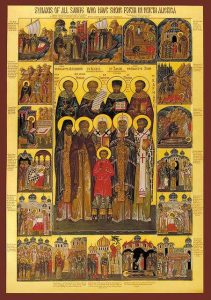 The feast of All Saints of Russia was first celebrated in the sixteenth century, but it soon fell into disuse, except by the Old Believers. It was revived at the Council of 1917-1918. Perhaps we would feel that this is a feast of “nationalistic pride,” for indeed, we celebrated the Feast of All Saints last Sunday, and all Christians, in all times and places, are called to holiness, to live in the grace of the Spirit, to work to bring all into union with God. However, perhaps it is also good to remind ourselves that people can be holy in all eras and cultures, and that there are so many saints walking among us in our own nation and times. In recent decades, many feast of the saints of a particular place or culture have been established – All Saints of Mt. Athos, All Saints of England, All Saints of Greece, All Saints of Carpatho-Russia, and so forth.
The feast of All Saints of Russia was first celebrated in the sixteenth century, but it soon fell into disuse, except by the Old Believers. It was revived at the Council of 1917-1918. Perhaps we would feel that this is a feast of “nationalistic pride,” for indeed, we celebrated the Feast of All Saints last Sunday, and all Christians, in all times and places, are called to holiness, to live in the grace of the Spirit, to work to bring all into union with God. However, perhaps it is also good to remind ourselves that people can be holy in all eras and cultures, and that there are so many saints walking among us in our own nation and times. In recent decades, many feast of the saints of a particular place or culture have been established – All Saints of Mt. Athos, All Saints of England, All Saints of Greece, All Saints of Carpatho-Russia, and so forth.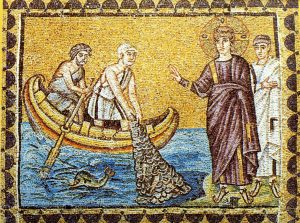 What does it mean to be a saint? Our Lord said, “I am the way, the truth and the life” (John 14:6). To be a saint, then, means to follow Jesus the Way, the true path to union with God and holiness. To be a saint is not a luxury for the few, but the necessity for all of us who want to know the truth, to live in Christ. In today’s Gospel, Jesus calls Peter and Andrew and John and James, and they IMMEDIATELY follow him. This call is given to us all. We have been meditating on Pope Francis’ Apostolic Exhortation, Gaudete et Exsultate – Rejoice and Exalt!
What does it mean to be a saint? Our Lord said, “I am the way, the truth and the life” (John 14:6). To be a saint, then, means to follow Jesus the Way, the true path to union with God and holiness. To be a saint is not a luxury for the few, but the necessity for all of us who want to know the truth, to live in Christ. In today’s Gospel, Jesus calls Peter and Andrew and John and James, and they IMMEDIATELY follow him. This call is given to us all. We have been meditating on Pope Francis’ Apostolic Exhortation, Gaudete et Exsultate – Rejoice and Exalt!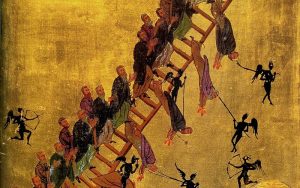 Fourth Sunday of the Great Fast: Commemoration of our Holy Father John of the Ladder
Fourth Sunday of the Great Fast: Commemoration of our Holy Father John of the Ladder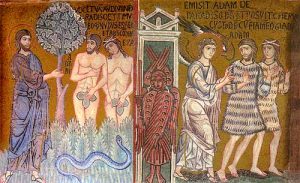 The readings from Genesis on the Fridays of the Great Fast point like an arrow to the covenant made on Good Friday, when our Lord gave his body and blood as a new covenant for the life of the world.
The readings from Genesis on the Fridays of the Great Fast point like an arrow to the covenant made on Good Friday, when our Lord gave his body and blood as a new covenant for the life of the world.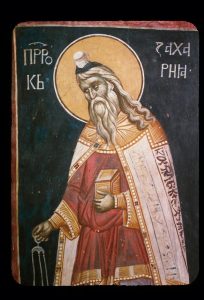 “Thus says the Lord: I have returned to Zion, and I will dwell within Jerusalem; Jerusalem will be called the faithful city, and the mountain of the Lord of hosts, the holy mountain. Thus says the Lord of hosts: Old men and old women will again sit in the streets of Jerusalem, each with staff in hand because of old age (Zechariah 8:1-2).
“Thus says the Lord: I have returned to Zion, and I will dwell within Jerusalem; Jerusalem will be called the faithful city, and the mountain of the Lord of hosts, the holy mountain. Thus says the Lord of hosts: Old men and old women will again sit in the streets of Jerusalem, each with staff in hand because of old age (Zechariah 8:1-2).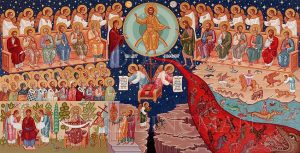 Today, the Church begins her preparations for the Great Fast ( aka, Great Lent).
Today, the Church begins her preparations for the Great Fast ( aka, Great Lent).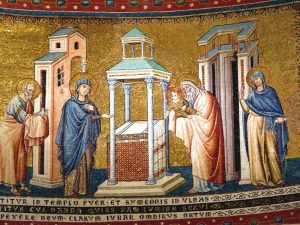 Today’s feast is also as known the Presentation of the Lord in the Temple of the Purification of Mary (Lk 2:22-40). The Liturgy of the Church prays:
Today’s feast is also as known the Presentation of the Lord in the Temple of the Purification of Mary (Lk 2:22-40). The Liturgy of the Church prays: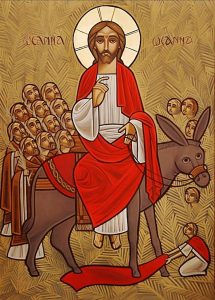 As a preparation for Holy Week and Pascha, the Gospel of the passion of our Lord according to St. Mark is read. Today Jesus enters Jerusalem as the people exclaim, “Hosanna! Blessed is he who comes in the name of the Lord! Which we sing at every Liturgy in the Anaphora. These acclamations proved to be hollow, when the priests and elders seduced the mob to ask for Jesus’ crucifixion.
As a preparation for Holy Week and Pascha, the Gospel of the passion of our Lord according to St. Mark is read. Today Jesus enters Jerusalem as the people exclaim, “Hosanna! Blessed is he who comes in the name of the Lord! Which we sing at every Liturgy in the Anaphora. These acclamations proved to be hollow, when the priests and elders seduced the mob to ask for Jesus’ crucifixion.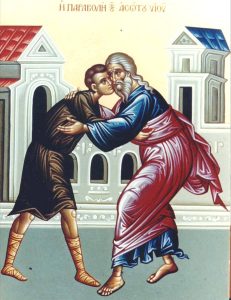 The parable read today is usually called “the parable of the Prodigal Son,” who is at the center of the story. It might also be called “the parable of the Merciful Father,” who welcomes back his son, embracing him, restoring him to his position, declaring a joyous celebration without even seeming to hear or listen to his son’s confession or protestation. It might also be called “the parable of the Petulant Son,” who is grumpy and peeved at the father’s merciful loving kindness because he thinks that he himself is so much better than his brother. As we prepare for the Great Fast, do we see a pattern developing? The pharisee thought he was much better than the tax-collector, the older son thought he was so much better than his prodigal brother, but God overflows in love for all his creatures. Perhaps the real main purpose of the Great Fast is to turn from pride to humility, to begin to see others through the eyes of God, to overflow in love for others. Truly, what does it mean to be a Christian?
The parable read today is usually called “the parable of the Prodigal Son,” who is at the center of the story. It might also be called “the parable of the Merciful Father,” who welcomes back his son, embracing him, restoring him to his position, declaring a joyous celebration without even seeming to hear or listen to his son’s confession or protestation. It might also be called “the parable of the Petulant Son,” who is grumpy and peeved at the father’s merciful loving kindness because he thinks that he himself is so much better than his brother. As we prepare for the Great Fast, do we see a pattern developing? The pharisee thought he was much better than the tax-collector, the older son thought he was so much better than his prodigal brother, but God overflows in love for all his creatures. Perhaps the real main purpose of the Great Fast is to turn from pride to humility, to begin to see others through the eyes of God, to overflow in love for others. Truly, what does it mean to be a Christian?